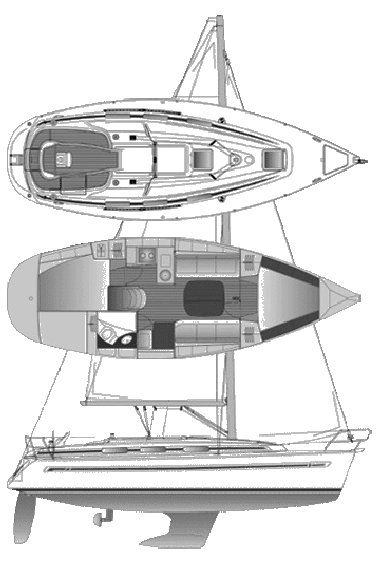The Bavaria 32, introduced in 2000, emerged as a compelling option for sailors seeking a versatile and accessible cruising yacht. Designed by the renowned J&J Design, this monohull quickly carved out a niche as a capable coastal cruiser, appealing to both families and couples with its emphasis on comfortable accommodations and straightforward handling. Built by Bavaria Yachts, a German shipyard celebrated for its efficient serial production and commitment to quality, the Bavaria 32 embodied the builder's philosophy of delivering well-engineered vessels to a broad market.
Bavaria 32 Information, Review, Specs

- Make
- Bavaria
- Model
- 32
- Number Built
- Production Year(s)
- 2000 - ??
History and Design
The Bavaria 32 marked Bavaria Yachts' entry into the new millennium with a fresh design from J&J Design, commencing production in 2000. This period was significant for Bavaria, as the company had pioneered assembly-line production methods, enabling the efficient construction of numerous boats annually. The shipyard, founded in 1978 by Winfried Herrmann and Josef Meltl, focused on building high-quality, series-produced yachts accessible to a wider audience, a principle clearly reflected in the Bavaria 32. The model was produced for several years before being succeeded by the Bavaria 32 Cruiser, introduced around 2011, distinguishing the original 2000 model from its later variant. The design goals for the Bavaria 32 likely centered on balancing comfortable living spaces with reliable sailing performance, characteristics that became hallmarks of Bavaria's cruising line. While a shoal draft version with a draft of 4.83 feet was available, the standard model featured a deeper keel, offering variations to suit different sailing grounds.
Sailing Performance and Handling
The Bavaria 32's design translates into a balanced and capable sailing experience. With a displacement-to-length ratio of approximately 171, she falls into the lighter end of the cruising spectrum, suggesting a boat that is relatively responsive and efficient through the water. Her sail area-to-displacement ratio, calculated at around 21.37, indicates good power for her size, hinting at a lively performance, particularly in lighter air conditions. This generous sail plan suggests she can maintain good speed even when the wind is light.
The ballast-to-displacement ratio, at approximately 0.28, is relatively modest. While this might suggest a need for earlier reefing in heavier winds compared to more heavily ballasted yachts, it is often offset by the hull's form stability, a common characteristic in modern production cruisers designed for interior volume. Owners frequently praise the Bavaria 32 for its "exceptional handling and comfort" and generally good sailing characteristics. She is known to be well-mannered, making her a predictable and enjoyable boat for a variety of conditions.
Accommodations and Layout
Despite its modest length overall of 33.75 feet, the Bavaria 32 is recognized for offering an "exceptionally spacious interior" for a boat of its size. The interior layout typically features a functional arrangement designed to maximize living space and comfort for a small family or crew. While specific headroom figures can vary, particularly in certain areas or with different keel configurations, the main salon generally provides good standing headroom.
The interior commonly includes a forward V-berth, a main salon with settees that can often convert into berths, a galley, and a head compartment. The galley is typically well-equipped for coastal cruising, and the salon offers a comfortable area for dining and relaxation. Aft cabins, while potentially having more limited headroom than the main salon, are generally considered adequate for the size. Throughout the interior, Bavaria's approach often blends functional design with a focus on ease of production, incorporating practical details for comfortable onboard living.
Owner's Perspectives
Owners of the Bavaria 32 generally appreciate its overall value, comfortable accommodations, and reliable sailing performance. Many commend its "solid construction and comfortable motion in a seaway," typical attributes for Bavaria yachts. The ease of handling and spacious interior are frequently highlighted as significant strengths, making it a popular choice for those new to sailing or looking for a manageable family cruiser.
However, some owners note that while the interior features a "clever layout and quality details," the boat was "built to a budget," which can sometimes be apparent in the finish. Around the early 2000s, Bavaria's rapid expansion in production led to some discussions among owners regarding build quality, though overall satisfaction remained high for the segment. Common maintenance considerations, often typical for production boats of its age, might include monitoring original deck fittings for leaks or addressing general wear and tear on systems and finishes.
Measurements
Construction & Hull
- Construction Material
- Fiberglass (Solid)
- Hull Type
- Monohull Sailboat
- Keel Type
- Bulb
- Rudder
- 1x Spade
- Ballast
- 2337 lbs
- Displacement
- 8267 lbs
- Water Capacity
- 32 gal
- Fuel Capacity
- 24 gal
Engine
- Engine Make
- Volvo Penta
- Engine Model
- MD2020
- Engine Type
- —
- Engine HP
- —
- Engine Count
- 1
- Drive Type
- —
- Fuel Type
- Diesel
Rig & Sails
- Rig Type
- Fractional Sloop
- P (Main Luff)
- -
- E (Main Foot)
- -
- I (Foretriangle Height)
- -
- J (Foretriangle Base)
- -
- Forestay Length (est)
- -
- Main Sail Area
- -
- Foretriangle Sail Area
- -
- Total Sail Area (Reported)
- -
- Total Sail Area (Calc)
- -
Dimensions
- LOA
- 33.75 ft
- LWL
- 27.83 ft
- Beam
- 10.92 ft
- Draft
- 5.83 ft
- Max Headroom
- -
- Air Draft
- -
Calculations
- Hull Speed
- 7.07 kn
- Pounds per Inch Immersion
- 1